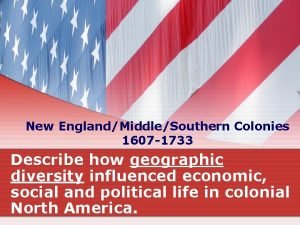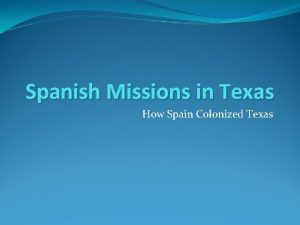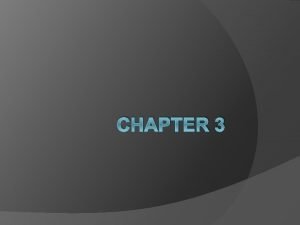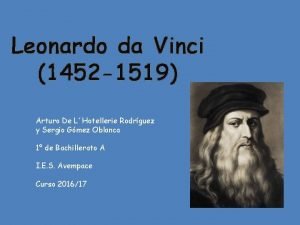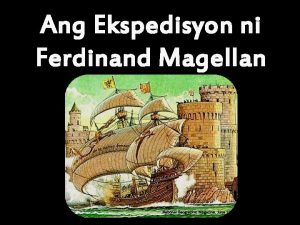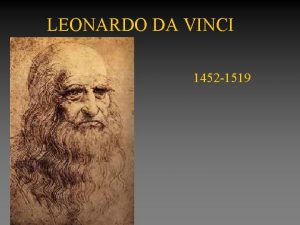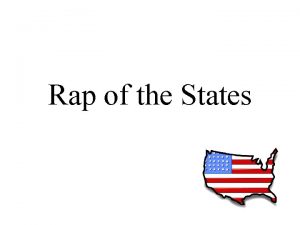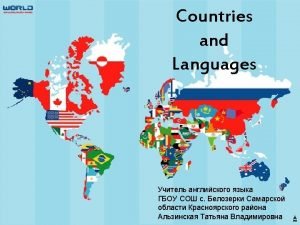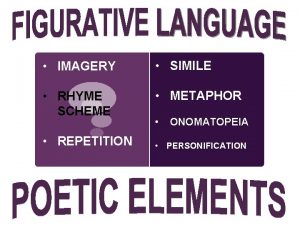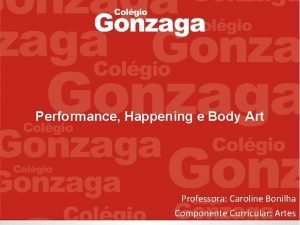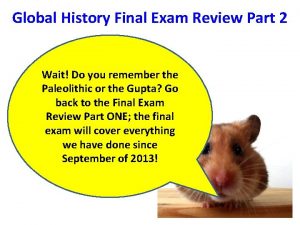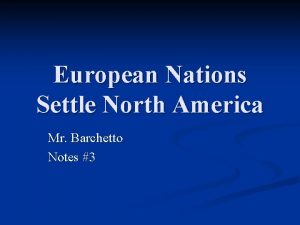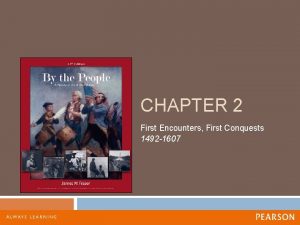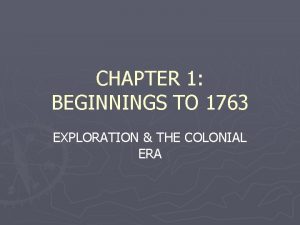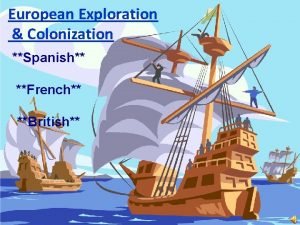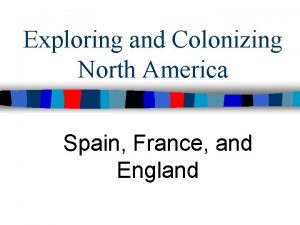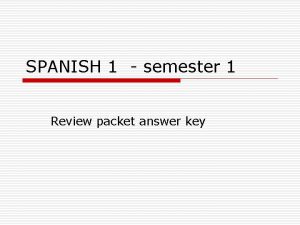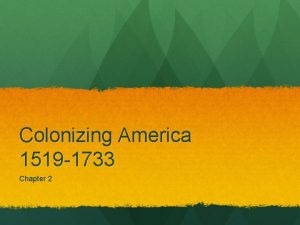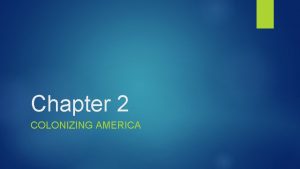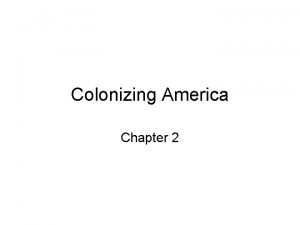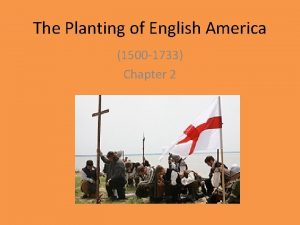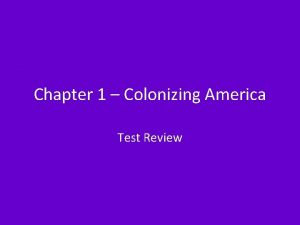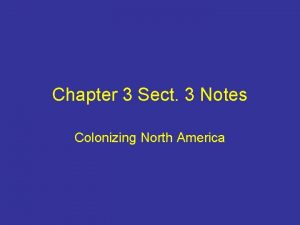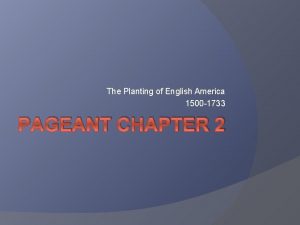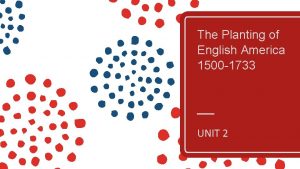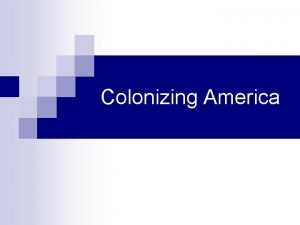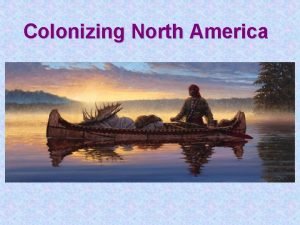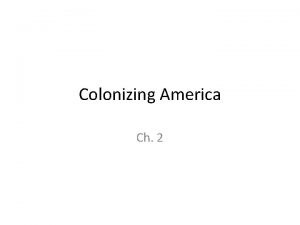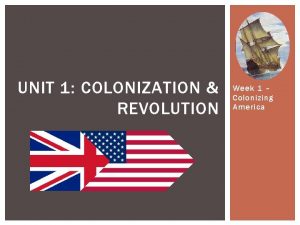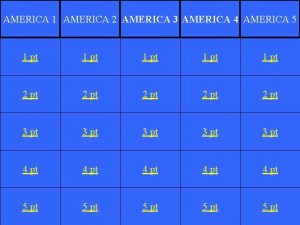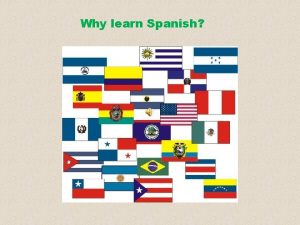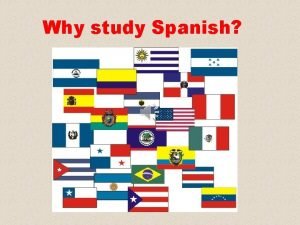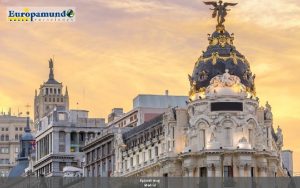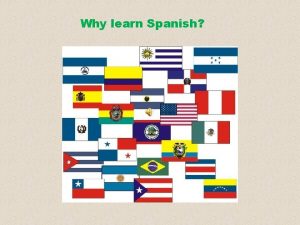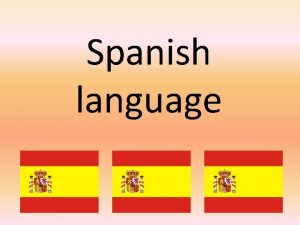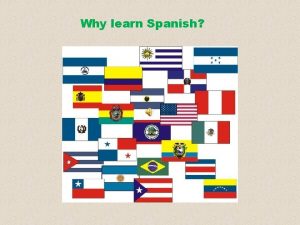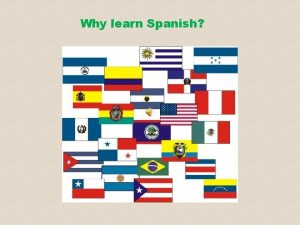Colonizing America 1519 1733 Chapter 2 The Spanish


































- Slides: 34

Colonizing America (1519 -1733) Chapter 2

The Spanish and French Build Empires Section 1

The Invasion Begins • European Weapons: crossbows, swords, guns, cannons • Montezuma thought Cortes was the god, Quetzalcoatl ▫ Fair-skinned, bearded god who came from the east to destroy the Aztecs • Montezuma sent an envoy to: pay tribute to Spanish king, and sacrifice captives • Cortes killed 6000 Native Americans. 11/8/1519 he entered the capital city peacefully

Cortes Defeats the Aztecs • Tenochtitlan – Aztec capital ▫ Larger than European cities, central plaza had double pyramid, canals in city, human skulls displayed • Human skulls displayed & priests had long hair matted with dried human blood • Cortes ordered all human sacrifices stopped ▫ Replaced Aztec statues with Christian crosses and images of the Virgin Mary ▫ Cortes finally defeated the Aztec in August 1521

New Spain Expands • Pizzaro explored Peru and encountered the Incas • Atahualpa – emperor of the Incas • Pizzaro wanted to meet Atahualpa at Cajamarca to ambush him ▫ The cavalry and cannons hid ▫ Atahualpa refused the Bible and threw it on the ground

French Empire in America • King Francis I wanted explorers to explore the coastline of North America ▫ Goal: Find Northwest Passage – water way to Asia • Jacques Cartier explored St. Lawrence River

Early Explorers Video • • 1. What was the “Age of Exploration”? 2. How did Louisiana get its name? 3. Why did La. Salle not know where he was? 4. La. Salle was credited with what even though his expedition failed?

English Colonies in America Section 2

England Takes Interest in America • Colony: settlement of people in foreign country ▫ Colonist – settler in the colony • Jamestown was the first permanent English colony in North America ▫ Henry VII sent John Cabot to discover & claim lands in North America ▫ England & Spain were allies before the Protestant Reformation If England tried to colonize North America, then it would threaten the alliance between itself and Spain

Reformation Divides Europe • Before 1517 – Europe was Catholic • Martin Luther started the protest against the Catholic Church • Protestant Reformation was the split from the Catholic Church • Luther was excommunicated (kicked out) from the Catholic Church • John Calvin suggested that neither kings nor bishops should rule the church ▫ Calvin’s ideas will impact the U. S. because it will give the colonists more of a say in their lives

Reformation Changes England • Henry VIII split from the Catholic Church because the pope would not annul his marriage ▫ He formed the Church of England (Anglican) • Many English wanted to purify the Anglican Church by taking out all Catholic practices ▫ Became known as Puritans ▫ Influence by John Calvin – elect its own ministers to control the church ▫ James I persecuted Puritans, the Puritans left and went to Holland

Economic Changes in England • Large estate owners no longer renting land to small farmers – begin herding sheep. This caused small farmers to lose money becoming beggars. These small farmers were interested in the idea of a better life in America • Joint-Stock Company: pooled money of investors without government financing.

England Returns to North America • Reformation changed the balance of power in England ▫ England was the leading Protestant nation; Spain was the leading Catholic nation • Walter Raleigh persuaded Elizabeth to send ships to scout American coastline ▫ Ships landed on Roanoke – named the land Virginia – Elizabeth – “Virgin Queen”

Jamestown is Founded • Virginia Company applied for a charter – sent 3 ships, 144 men, and founded the colony of Jamestown ▫ Named after James I (king of England) • Early Troubles – settlers were townspeople – most of tem did not know how to raise livestock or plant crops • 53 settlers remained in 1608 – most would have died if it were not for John Smith and Powhatan • Smith set up trade with the Powhatans – winter became known as the “Starving Time”

First Assembly • Virginia Company wanted to attract more settlers ▫ First reform in the colony was to elect an assembly to make laws ▫ First assembly held on 7/30/1619 and the VA government included a governor, 6 councilors, and 20 representatives ▫ The representatives were called Burgesses and the assembly was called the House of Burgesses

Virginia Becomes a Royal Colony • 4500 settlers in VA in 1662, the increased number alarmed Native Americans ▫ Native Americans attacked Jamestown and killed 350 settlers ▫ James I revoked Virginia Company’s charter to own Jamestown and made it a royal colony which was to be governed by a governor appointed the king

Maryland is Founded • Lord Baltimore founded the colony of Maryland ▫ As a haven (safe place) for Catholics who were persecuted in England ▫ Proprietary colony – meant to make $$$$ ▫ A colony that could be governed in anyway by its owner ▫ Many protestants came to the colony, but it was founded for Catholics to escape England

New England Section 3

Pilgrims Land at Plymouth • Separatists became known as Pilgrims – James I threatened to imprison them for challenging his authority • 1620, Pilgrims sailed to America on the Mayflower with 102 passengers – took them 65 days

Puritans Found Massachusetts • Two reasons: economic & religious hardships in England • City Upon a Hill ▫ John Winthrop – stock holder in the Massachusetts Bay Company ▫ Create a colony as a refuge for Puritans ▫ 1630, 11 more ships and 900 settlers went to MA colony ▫ Capital = Boston

City Upon a Hill (Continued) • 1643 – 20, 000 settlers in the MA colony • Winthrop hid the charter that gave the General Court the right to make laws ▫ General Court realized they were supposed to make laws and be elected by citizens • Punishable by flogging: 1. blasphemy, 2. adultery, 3. drunkenness, 4. gambling • Tried to keep people with different religious out ▫ Called these people heretics

Rhode Island & Religious Dissent • Roger Williams – minister in Boston, challenged Puritan beliefs because did not like purifying the Anglican Church. Founded the town of Providence – government had no authority over religion – different religions were tolerated • Anne Hutchinson claimed she knew which ministers had salvation – charged with heresy • She claimed God spoke directly with her, she contradicted the Puritan belief that God only spoke through the Bible

River Towns of Connecticut • Reverend Thomas Hooker asked the Gen. Assembly to move his congregation to the Connecticut River Valley ▫ Wanted to move because they did not have enough land to raise cattle ▫ Every church member should be able to elect the governor and General Assembly ▫ 1637, Hooker was allowed to move and the towns of Hartford, Windsor, and Wethersfield joined together to make Connecticut Fundamental Orders of Connecticut – first written constitution in America

New Hampshire & Maine • Capitan Jon Mason founded the colony of New Hampshire • Fernando Gorges called his territory Maine

King Philip’s War • Traded for tools, guns, & metal • Fur trade decreased; demanded Native Americans follow English laws and customs ▫ Native Americans felt the English were trying to destroy their way of life ▫ 1675, arrested and executed 3 Wampanoag for murder – beginning of King Philip’s War ▫ Metacomet – Wampanoag leader – King Philip • Colonists won – (1) New England belonged to the colonists, (2) surviving Native Americans scattered

Middle and Southern Colonies Section 4

English Civil War • No colonies due to a civil war in England, king took power back & colonization was promoted again ▫ Colonies were a vital source for raw materials & a market for manufactured goods

New Netherlands becomes New York • 1664, 10, 000 people – needed labor – imported slaves from Africa – 10% of population African slaves

New York & New Jersey • 1664, King Charles II decided to take New Netherlands from the Dutch because they had helped the British colonies smuggle European goods (Navigation Acts, we’ll talk about this later) • Gave Delaware Bay to Sir George Carteret, Lord Berkeley, and Duke of York • The Duke of York gave part of his land to an advisor from Jersey – named a part of the colony of New York New Jersey

Pennsylvania and Delaware • 1680, King Charles in debt to William Penn’s father – granted him land between New York and Virginia in settlement of the debt ▫ Religious motives – rid England of Quakers • Quakers – believed that everyone had an “inner light”, No need for a church or ministers ▫ Objected to: political & religious authority, violence, and paying taxes ▫ Tried to live in other colonies, but were persecuted, needed a colony of their own

New Southern Colonies • North Carolina named for Charles II (Latin) • Most settlers had drifted from Virginia • The colony did not grow quickly because it did not have a good harbor/port (why was this important? ) • Farmers grew tobacco – merchants exported naval supplies (tar, pitch, turpentine)

South Carolina • Thought it was suitable for growing sugar cane – not really, they will find out • First settlement named Charles Town – after King Charles • South Carolina exported deerskin (used for leather) • Captured Native Americans & shipped them to the Caribbean to be used as slaves

Georgia Experiment • James Oglethorpe asked George II for land south of Carolina to help solve the problem of debtors and poor in England ▫ The colony served 2 purposes: (1) help solve the problem of poor people in England, (2) buffer-zone between Spanish Florida & English colonies ▫ Georgia was named after George II ▫ Banned items in the colony: slavery, rum, and brandy

England’s American Colonies • Population of English colonies in 1775 = 2. 5 million • England ignored the colonies, known as Salutary of Neglect (Talk about this later) • Colonists became used to having their own way and they felt it was their right to keep it that way… • And the seeds of rebellion were planted and the foundation for the American Revolution laid.
 1733-1607
1733-1607 Why did the spanish establish missions in texas
Why did the spanish establish missions in texas Motives for colonizing plymouth
Motives for colonizing plymouth Leonardo da vinci 1452 1519
Leonardo da vinci 1452 1519 1452 - 1519
1452 - 1519 1519 minus 1452
1519 minus 1452 Sanduguan ni magellan at humabon
Sanduguan ni magellan at humabon 1452-1519
1452-1519 Leonardo da vinci was born on april 15 1452 in the small
Leonardo da vinci was born on april 15 1452 in the small Rap of the states
Rap of the states Asia africa song
Asia africa song Repetition in let america be america again
Repetition in let america be america again Why is latin america called latin america
Why is latin america called latin america Eu amo a américa e a américa me ama
Eu amo a américa e a américa me ama Spanish north america
Spanish north america Spanish north america
Spanish north america Spanish north america
Spanish north america Spanish north america
Spanish north america New exploration
New exploration European colonization of americas
European colonization of americas Spanish final exam review packet answer key
Spanish final exam review packet answer key Hình ảnh bộ gõ cơ thể búng tay
Hình ảnh bộ gõ cơ thể búng tay Lp html
Lp html Bổ thể
Bổ thể Tỉ lệ cơ thể trẻ em
Tỉ lệ cơ thể trẻ em Gấu đi như thế nào
Gấu đi như thế nào Chụp phim tư thế worms-breton
Chụp phim tư thế worms-breton Alleluia hat len nguoi oi
Alleluia hat len nguoi oi Các môn thể thao bắt đầu bằng tiếng đua
Các môn thể thao bắt đầu bằng tiếng đua Thế nào là hệ số cao nhất
Thế nào là hệ số cao nhất Các châu lục và đại dương trên thế giới
Các châu lục và đại dương trên thế giới Công thức tiính động năng
Công thức tiính động năng Trời xanh đây là của chúng ta thể thơ
Trời xanh đây là của chúng ta thể thơ Cách giải mật thư tọa độ
Cách giải mật thư tọa độ Phép trừ bù
Phép trừ bù
